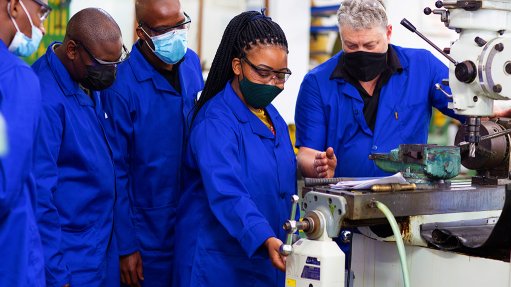
PASSING THE TORCH The improved skills pipeline enabled by High Gear will contribute towards the automotive components manufacturing sector’s localisation and transformation objectives
Following its initial launch in March last year, skills development initiative High Gear and its partners are launching several technical vocational education and training (TVET) curricula upgrades over the next six months.
The High Gear initiative is a collaboration between the National Association of Automotive Component and Allied Manufacturers (NAACAM) and the Department of Higher Education and Training (DHET). High Gear is managed by global non-profit organisation IYF, with a view to handing over the reins to NAACAM after an initial four-year period.
High Gear’s lead public TVET college partners are Eastcape Midlands College in the Eastern Cape and Elangeni College in KwaZulu-Natal.
The UK government’s Skills for Prosperity Programme is funding the project in KwaZulu-Natal, and the US Agency for International Development and the Michael and Susan Dell Foundation are funding the project in the Eastern Cape.
High Gear is aimed at demonstrating a model for sustained industry involvement in TVET course design and delivery that generates enthusiasm from TVET educators and the industry while generating positive returns for young people and employers. This model is aimed at ensuring that the TVET college system provides a reliable and market-aligned skills pipeline.
“This improved skills pipeline enabled by High Gear will contribute towards the automotive components manufacturing sector’s localisation and transformation objectives while also linking young people to high-quality career opportunities and pathways,” says IYF South Africa High Gear programme director Colin Hagans.
Project-Based Learning
The codesigned project-based learning upgrades at public TVET college partners, in collaboration with industry experts, will include portable electrical engineering and mechanical engineering demonstration kits that TVET lecturers can use in classrooms to add a practical element to engineering theory courses.
To this end, High Gear has worked with industrial automation company Compuscan Manufacturing in Kariega, in the Eastern Cape, to design and produce the toolkits for electrical engineering and mechanical engineering lecturers of national accredited technical education diplomas, levels four to six, at Eastcape Midlands College and Elangeni College.
Training and ongoing mentoring of lecturers to support their use of these toolkits began last month.
Additionally, a partnership has been established with the Automotive Industry Development Centre – Eastern Cape (AIDC-EC) to launch the High Gear work-integrated learning component in the Eastern Cape.
The AIDC-EC will lead the charge in terms of sourcing employers who are willing to provide short workplace experiences for TVET students and lecturers.
The first industry placements for Eastcape Midlands College and Elangeni College lecturers took place last month and will continue periodically throughout the life of the initiative for both lecturers and students.
“Our TVET college partners are actively adding innovations to what High Gear is designing, thanks to the passionate educators and managers at these colleges,” Hagans comments.
He adds that the IYF has worked with NAACAM to launch the High Gear work-integrated learning component in KwaZulu-Natal. Similar to the role that AIDC-EC is playing in the Eastern Cape, NAACAM will take the lead in sourcing employers who are willing to provide short workplace experiences for TVET students and lecturers in the province.
Online Platform
The IYF and NAACAM have also codesigned an online career experience platform concept that is aimed at orienting TVET students towards career pathways in automotive components manufacturing.
The platform will highlight TVET graduates and other young people who have built successful careers in the industry while providing students with mini-games and IYF’s online Passport to Success work readiness training programme to build priority industry competencies, Hagans explains.
“We are also exploring linkages with the SAyouth.mobi presidential youth employment intervention platform to support TVET graduates’ job search efforts,” explains NAACAM commercial director Shivani Singh.
She notes that High Gear has contracted a vendor to build the online career experience platform, with the final full build expected to launch in the first quarter of next year.
NAACAM’s webpage will host the platform, while the IYF will take the lead on presenting demonstrations at TVET colleges to support lecturers to integrate the platform into their teaching. The United Nations Development Programme, with funding from the Government of Japan, is also cofunding the development of this online platform.
All three funding partners are supporting High Gear’s national stakeholder engagement and learning efforts.
Priority Industry Competencies
These developments come on the back of collaboratively designed industry competency models for the automotive components manufacturing industry, which were based on open-source competency models for the global advanced manufacturing sector.
Using these customised industry competency models, High Gear partnered with the Durban Automotive Cluster and the East Cape Automotive Industry Forum to determine which specific competencies were most critical for TVET engineering graduates seeking careers in automotive manufacturing.